
VOL. II. No. 9 NOVEMBER 3, 1944 FOR U.S. ARMED FORCES PRECENSORED FOR MAILING
Succeeding General Stilwell as American commander in the newly formed China Theatre is Major Gen. Albert Coady Wedemeyer, who has also been appointed Chief of Staff to General Chiang Kai-shek. Wedemeyer has had long experience on the Army General Staff and is thoroughly trained in war planning. He was named Deputy Chief of Staff to the Allied Southeast Asia Command, under the British coimmander, Lord Louis Mountbatten last October. General Wedemeyer has spent more than two years studying Nazi techinque and methods. He attended the German War College in Berlin from July 1936 until August 1938. When he returned to the United States he was assigned to the 29th Infantry at Fort Benning, Georgia, and in January 1940 became executive officer of the 94th anti-tank battalion. 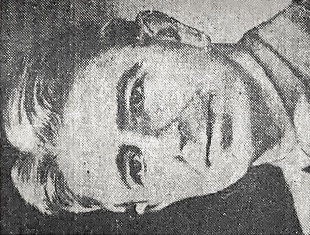 Albert C. Wedemeyer
Albert C. Wedemeyer
Born in Omaha, Nebraska and a graduate of West Point, he was commissioned a second lieutenant of Infantry on November 1, 1918, just 10 days before the Armistice was signed ending the World War. In 1919 Wedemeyer made an observation tour of European battlefields and when he returned to the U.S. he entered the Infactry School at Fort Benning. In June 1920 he was assigned to the 28 Infantry. General Wedemeyer held posts in the United States from 1925 to 1930, then was assigned to Tientsin, China. Named aide to the Commander of Corregidor in March 1932, he spent two years there before entering the Command and General Staff School at Fort Leavenworth, Kansas. He graduated after two years of study in 1936. Then a Captain, he served within the Intelligence Division, War Department General Staff, until his assignment to Germany. He was promoted to Brg. Gen. Jul 7, 1942, and to Major Gen. Sept. 20, 1943. |
‘DI’, NEW I-B BOSS,
IS A GI AT HEART
United Press War Correspondent
The local American military commander, envisioniong a real, honest to goodness sultan, complete with tons of jewels and a bevy of veiled dancing girls, leaped into action.
The plane taxied up and out stepped a tough looking American general. His name . . . Sultan . . . Lt. Gen. Daniel Isom Sultan of Oxford, Miss.
It seems like all of the anecdotes concerning the new commanding general of the IBTO (i.e. India-Burma Theater of Operstions) are laid around the General's unusual arrivals in planes and hios antipathy for inefficiency.
Who am I to be different.
Paul Feng, the eminent Chinese journaliust, and I were sweating out a plane ride "somewhere in Burma." We had been playing gin rummy on an empty beer case for about five hours. Acting as kibitzer was an Air Corps. Pfc.
A battered-up C-47 taxied up and out poured the brass. Feng said, "That looks like Gen. Sultan."
In unison the GI and I replied, "Who the hell is he?"
"Probably some guy who will demand a shiney staff car complete with liveried footmen," the Pfc. said, "I guess I better go out and meet him in my jeep."
"Who is this Sultan, Paul," I asked, as the GI headed out to the plane driving through the pourimng rain in his jeep, that was topless and withouit a wind-shield.
"For god's sake, don't you know?... He is Uncle Joe's deputy. Second in command in the whole theater," he patiently answered this dope who had never met anyone higher than a chicken colonel.
"Well why haven't I heard anything about him." I said.
"You won't... the old boy is not one for publicity."
That just about covered it. Then Paul began telling me some things about "this guy, Sultan." He said he was a quiet, inconspicuius man who had a knack of getting things done properly and in a hurry.
He had served in the Philippines, Nicaragua, France... and Chicago. He was not only an able engineer and administrator but a top-notch leader of combat troops.
Sultan wa born in 1885... so as near as I could figure that makes him about 59 years old.
Ironically he wanted to go to the U.S. Naval Academy, but was side-tracked to the "Point" when an appointment came up.
He is not a great party thrower but when social responsibilities arise he entertains in the best old school southern style. He smokes, drinks and plays a tight game of poker. When you call on him, the General listens with an expressionless face and drums his fingers on the desk. If he starts firing questions... brother, have an answer ready.
He has a consummate curiousity as exemplified by a question he tossed at his aides one day. The confused couriers were asked, "At what revolutions-per-minute do you start seeing through a fan without seeing the individual blades?"
And don't... don't ever bring hime a paper and then start telling him what is in it as he is reading. One aide who tried that got the curt reply, "Damnit, I can read."
All the time Feng was telling me this, I was watching the General... one hundred yards away, standing in the rain. I saw our Pfc. drive up and salute.
Sultan was wearing a beat-up old campaign hat, if I remeber right. So that should put may minds at ease... at least those who have been using cigarette holders and sporting the old cavalry headgear ala Uncle Joe.
"Now I will see what kind of a Joe this Sultan is," I told Paul, "Watch him raise hell about transportation."
Not Dan Sultan. He jumped into the mud-splattered jeep with our GI friend and headed back toward us. As he drove by I could see the serious expression on the Pfc's face. In all his glory he was chauffering three stars. The rain was pouring down on the Pfc. and the General.
But that was not the face I remeber so vividly. I took a good gander at the fellow who is now our boss out here in the IBTO.
If the Japanese could see the determined look on the face of that man, they would start pulling stakes but pronto. He means business.
|
Mawlu Captured In North Burma KANDY, Nov. 2 - Today's SEAC communique reports the capture of the Burmese town of Mawlu by troops of the 26th Division. British troops of the 36th Division, under Major General Festing, captured Mawlu late in the afternoon on October 31. There was light Japanese opposition, but few casualties. Mawlu is 47 miles southwest of Hopin and 16 miles north of Naba Junction, where the Myitkyina-Mandalay railway has a branch line of 15 miles to Katha. "Chinese troops continued patrol action in the Myothit area, northeast of Bhamo. "Arakan: Artillery duels and patrol clashes continue over a wide area. "Air Aircraft of Eastern Air Command attacked lines of communications, enemy positions and a supply base in the Chindwin region yesterday. Jap Air Strength Weakened In China WASHINGTON, Nov. 2 - Diversion of Japanese air power from China proper, where American air bases are endangered, is expected by Army Air Force authorities to be one of the results of the Philippines offensive. The comparative lull in the air situation over China is said to be directly related to the Leyte offensive plus Allied air blows at Formosa. While Japanese ground forces are trying a pincer movement to cut off the coastal area of east China, the deficient air strength in China is apparent in the fact that they have been unable to mass more than 20 airplanes at a time in recent weeks and have only grudgingly given air support to ground troops. At the same time, naval experts caution against over-optimism about the Philippines victory, stressing that success will depend on the speed with which it can be capitalised and asserting that naval strategy demands quick following-up of a smashing blow. |
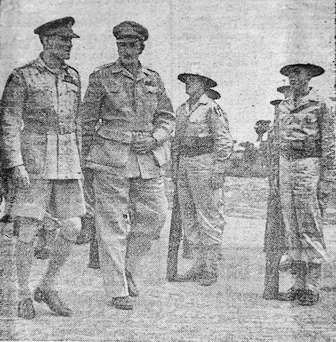 At an airport near Calcutta, General Sir Claude Auchinleck, left, Commander in Chief in India, with Col. Douglas L. Crane, Deputy Commander, Base Section 2, inspects the American Guard of Honor. (Signal Corps photo)
At an airport near Calcutta, General Sir Claude Auchinleck, left, Commander in Chief in India, with Col. Douglas L. Crane, Deputy Commander, Base Section 2, inspects the American Guard of Honor. (Signal Corps photo)
|
Arriving in Calcutta last Sunday morning, General Sir Claude Auchinleck, Commander-in-Chief in India, was met at the airport by an American Guard of Honor made up of Base Section 2 soldiers. Col. Douglas L. Crane, Deputy Commander, Base Section 2, personally greeted Gen. Auchinleck on behalf of the U.S. Army.
|
Following an inspection of the Guard of Honor, Gen. Auchinleck, who has been associated with U.S. Forces since the days when American tank crews fought side by side with their English comrades in the Western Desert, said that this was his first opportunity to inspect an American Guard of Honor and he considered it a great honor. In fact, he called it smartest he has seen in his 40 years' service.
On Tuesday Gen. Auchinleck visited Major General George E. Stratemeyer's Eastern Air Command and USAAF Headquarters. Accompanied by Gen. Stratemeyer, Major Gen. Thomas J. Hanley, Jr., commanding general, Air Service Command, and Air Vice Marshal Alexander Gray, assitant air commander, Eastern Air Command, the visiting official made a brief tour of headquarters, visiting the enlisted men's mess, the tent area, the junior officers' quarters, the WAC quarters and the office section.
Later, Gen. Auchinleck and his party lunched in the Officers' Mess, following which they left the post. With Gen. Auchinleck at EAC headquarters were General Mayne, commanding general, Eastern Air Command, Capt. Ormrod, A.D.C. to Gen. Auchinleck, Lt. Col. Ridgeway, Personal Assistant to the C-in-C and Lt. Col. Maxwell of Eastern Command.
|
|
VU2ZU Will Carry Late Voting Dope Every effort to give the most complete coverage possible on the election returns will be made by the Armed Forces Radio Station VU2ZU, it was announced today by station director M/Sgt. A. Van Mitchell. On November 8th, the regular broadcasting schedule will be interrupted during the day on order to bring to the stations listeners the latest results as they come in. Special permission has been obtained so that the station may use the facilities of all the accredited news services, in addition to monitoring the broadcast of the BBC and the U.S. networks. There is no certainty when the final results of the elections will be available since in some states the servicemens ballots will not be counted until late in the month, and the possibility exists that the voting may be close enough that these ballots may have a direct bearing on the final choice of the candidate winning the election. |
|
Proper Inevitable
LONDON, Nov. 2 - Invasion of Japan now looms not only as a possibility but is inevitable - when the Philippines are secure.
The American Navy has always believed that one day it would be possible to crush enemy air and sea power sufficiently and for long enough to carry the fight to the heart of the Japanese Empire. That day has now come.
Already Manila, capital of the Philippines, is gravely threatened and the occupation of Luzon, the big island on which it stands, is not far distant. When that is done the United States will dominate the Philippines and once again hold Cavete as a naval base. Then, too, the Philippines will be a vast air base from which we can strike at Borneo, Celebes, the China coast and Formosa.
There will still be bitter jungle fighting when ultimately we return to Malaya and Singapore, but here on Leyte and dozens of other islands and atolls throughout the Pacific and in New Guinea the result is a foregone conclusion.
AAF Concentrates On 10 Plane Types
WASHINGTON (ANS) - Ten types of American warplanes have just been selected by the Army Air Corps to carry the battle to the enemy throughout the world. The ten planes on which the Army will concentrate include the P-38 Lightning, P-47 Thunderbolt, and P-51 Mustang fighters.
The medium bombers include B-25 Mitchell and the A-26 Havoc, the newer version of the Havoc. Heavy bombers will include the B-17 Flying Fortress, the B-24 Liberator, and the B-29 Superbombers. The C-54 four-engined Skymaster will probably replace the twin-motored C-46 Curtiss Commando and the C-47 Douglas Skytrain. Increased production of the C-69 Lockheed Constellation is also expected.
The Army is cutting back or eliminating production on several planes, including the P-40 Warhawk, P-39 Airacobra, P-63 King Cobra, the P-75 experimental Flying Wing, the A-20 Havoc, and the B-26 Marauder.
|
$500,000,000 Cargo And All In Hard Cash ATC BASE, INDIA - Resting safely in the 201 file of Capt. Roy Barnes, operations officer at this Assam base of the India China Division, ATC, is a receipt from the Chinese Government for a shipment of five hundred million dollars. The money being shipped to China, was in Chinese bank notes weighing nine tons. Three airplanes were required to carry the shipment, and the planes flew in a tight formation all the way from India to their final destination. The crews travelled under orders not to abandon their aircraft under any circumstances, for if a plane were to crash and the money were picked up by unauthorized persons, it would affect seriously the stabilization of Chinese currency. Capt. Barnes, who lives in Kansas City, Mo., was a pilot of one of the three planes and was in charge of the shipment. Ex-Paratrooper In Thirteenth Jump Lt. Norbert J. Murray, a fighter-bomber pilot with the Red Gorillas Squadron, Tenth Air Force, Eastern Air Command, recently thwarted superstition by successfully completing his thirtheenth parachute jump. On a routine flight from his advanced base in India, the engine of his P-47 (Thunderbolt) cut and he was forced to bail out. He landed a few miles from his base but in heavy jungle. Fortunately with the aid of his compass and machete, he made his way to a road where he found a jeep which had been left by a rescue party that was looking for him. With the aid of the jeep he finally located the group and led it back out of the jungle. Lt. Murray made his first twelve jumps as a paratrooper, before he got his appointment as an Aviation Cadet. He attended the Mary D. Bradford High School, Chicago and worked for a construction company there. His home is Ion Milwaukee, Wisconsin. |
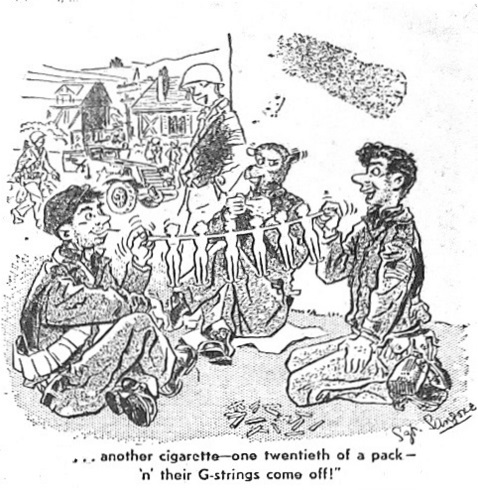
|
ABDUL USES TELEPHONE LINE
TO STRING GALS A LINE
As Abdul and I were sitting in the empty orderly room, the phone rang. I was too comfortable to be disturbed, so I told Abdul to answer it. He picked up the receiver and said in a very dignified way, "Hello." Then his voice changed. His eyes lit up, and in the very best English he picked up from my Hindustani book, he said, "Why hello beautiful. How are you? I haven't seen you in a long time." I knew from the tone in his voice that he was going to be on for a pretty long tome. As I didn't have much to do, I figured that I might just as well listen and maybe learn a few pointers myself. My lines need a little brushing up on lately. It wouldn't hurt to take a few tips.
Abdul started raving on with, "The moon sure is beautiful tonight, honey. It's a shame that it's going to be wasted, Just think - you and me in the moonlight under the tropical palms." He kept snowing her under with beautiful nothings till I got tired of listening. I told him I'd be back later and I started out of the door. He told me to wait, but I kept going.
I headed for the barracks and couldn't help thinking of why Arabella hadn't called me in the past week. I thought I'd go to the Red Cross Day Room and make a call. See if she's doing anything tonight. I called the number. (Humm-thought I was going to give her phone number away, eh?) After I waited for a while the operator belched out with that old familiar phrase, "Engaged." I said, "Oh, that's alright, I've called up married women." Then I heard a click and hung up.
|
I asked the Red Cross gal if she had any good books to read while I waited to make a call. She showed me the bookcase and I started gazing for a good one. Then the ARCer came up to me and said that she thought that she had a book that I might be interested in. When she handed it to me and I read the title out loud, she began blushing. She said, "Oh I'm sorry. I didn't mean to give you 'Erotic Edna.'" Then she snatched the book out of my hand and gave me another one which was about as boring as a bore. I pretended I was reading the book till she left. Then I went over and grabbed the copy of "Erotic Edna," which seemed to be a lot more interesting than the other book.
When I got in the mood,. I went over to the phone to try another call to Arabella.
After making about five calls and getting the same answer, I began to believe that maybe the line was busy. Could it be that Lieutenant with whom I saw her at Firpo's? I can't understand why she wants to go out with an Officer when she can go out with me? (I don't want any nasty remarks from anybody). So if she wants to go out with Lieutenants I'm going to start stepping out, and when I start stepping out, brother, I step out!
Now let me see, where's that little black book in which I put all my addresses? As I hunted through my pockets looking for the
|
I made my way wearily back to the oderly room.
As I walked Abdul was still stringing the same dame a line. I asked him, "Is that the same girl I left you talking with some hours ago?" He silenced me with a look, and kept on babbling beautiful words half in English and half in Hindustani. The Hindustani I couldn't understand, but if it was anything like the English, it was a lot better than the lines that I have strung in the past few months (and that's something, coming from me!)
I have never been one for playing a waiting game, and if Abdul thinks I'm going to make an exception in his case, he's go another think coming. "Come on Abdul, it's about time you put that receiver down." "One minute, Sahib," said my faithful bearer with pleading eyes. "O.K. only one more minute." Abdul resumed his telephone conversation, saying "Now don't forget tomorrow night at 8 by the cow-paddies in Ballygunge district." My patience was just about worn down to the last shred. "Come on, Abdul," I yelled, "and put some 'juldi' into it." Abdul looked at me like a faithful dog that has been kicked by its master and said, "You're a hard man, Sahib," and handed the receiver to me with, "this call is for you."
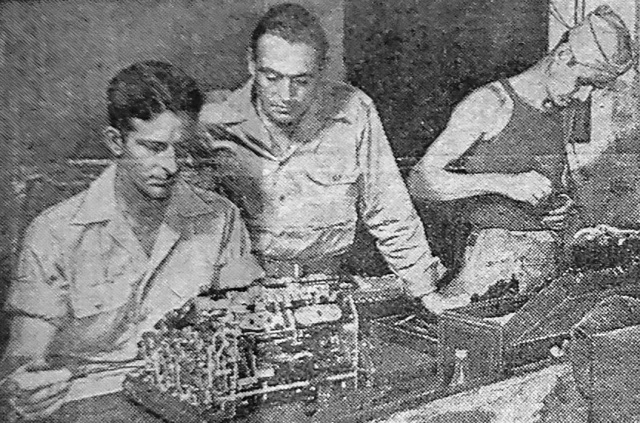 Sgt. Harry F. West, Aberdeen, S.D., repairs an adding machine while Sgt. William A. Payne, Charlotte, N.C., a fellow-fixer peers over his shoulder. To their right, Sgt. William J. Robinson, Camden, N.J., lends his skilled touch another machine in the Base Section 2 typewriter shop. (Signal Corps photo)
Sgt. Harry F. West, Aberdeen, S.D., repairs an adding machine while Sgt. William A. Payne, Charlotte, N.C., a fellow-fixer peers over his shoulder. To their right, Sgt. William J. Robinson, Camden, N.J., lends his skilled touch another machine in the Base Section 2 typewriter shop. (Signal Corps photo)
In an Army, where the word "mechanized" has become a by-word on almost every front, the natural inclination is to think of tanks, trucks and heavy equipment. No small share of the job of running a modern Army however, falls upon the thousands of ofice machines, duplicators, calculators and mimeograph machines. To keep the Army's office machinery working at top capacity the Base General Depot typewriter repair shop was established... from its initiation in June, 1943 to the present times the shop has repaired 4268 typewriters, 162 adding machines and 105 duplicating machines. Five "tours" have been made by the personnel of the shop to repair machines at various isolated spots throughout the Theatre. Chief Mechanic and Supervisor of the shop is Sgt. Clyde M. Bahnmaier of Lawrence, Kansas, former a typewriter repairman in civilian life. Sgt. Bahnmaier is assisted by Sgt. William H. Payne, of Charlotte. N.C., of the Underwood Company, Sgt. Harry F. West of Aberdeen, S. Dak., formerly with the Burroughs Adding Machine Company, and Sgt. William J. Robinson, of Camden, N.J. who worked for Remington-Rand Company before entering the Army. All these men held the title of Chief Mechanic, and they supervise a large staff of civilian workers, most of whom worked for American typewriter companies in their Indian branches before the war. Though the men have had experience in all phases of the repair of office machinery, they have never been up against the kind of tough jobs they find themselves faced with every day, keeping the Army's machines going. It is not a rare thing for a machine to be turned in for repair after having been run over by a jeep, or after being fished out of a river. Weather too, plays an important part in the task. The climate of India and Burma is not conducive to the best results in intricate machines such as an office calculator, and keeping them free from rust is a major job. The Army personnel and civilian mechanics have learned that the "feel" of the inside of a typewriter, much as a component typist knows the keyboard of her machine. The Base General Depot now maintains a stock of spare parts for shipment to installations where competent mechanics are available to do the work, but the bulk of the repair job for the entire Theatre continues to fall on the Base General Depot's typewriter repair shop. |
Sidney Morning Herald, War Correspondent The gliders belong to the same Air Commando unit which flew Wingate's second Chindit expedition into northern Burma. Each glider is equipped to carry four litter cases and four other wounded. During a recent five-day period, no fewer than 500 men were evacuated to a big airbase from which they were quickly transported to a hospital. In one day, 70 patients were evacuiated. Normally, evacuating patients entails ambulance driving over long stretches of dreadful country and handling by various subsidiary medical units. Delivering them to hospitals occupies only a couple of hours by air. Glider evacuation operations take place on several makeshift airstrips, some of them no more than mere clearings in which sufficient trees have been removed to allow passage for big tow-planes. Gliders, having been flown on by transports, are quickly loaded and then comes the extraordinary feat of getting gliders with their helpless human caqrgo into the air. Thios operation is known as "snatching." Gliders are pushed until they are between two posts from which a loop is attached and passed over the top well above the glider. Each tow-plane has a cable with a hook on the end attached to a drum which can be adjusted to regulate pressure as on a big fishing reel. This reduces the impact on the glider. For normal glider operation a cable and cord extend 150 feet over the glider, but in this "life and death" snatching process it is 300 feet long to avoid unnecessary discomfort to the patients. Transport planes, often skirting jungle thicknesses, fly at the low speed of 100 miles per hour, allowing the hook on the cable to catch in the loop above the glider. The glider is then towed to a well prepared base and cut loose, landing safely under control of its own pilots. Men in gliders undergo breth-taking experiences of being stationary and then, in a fraction of a second, being lifted through space at 100 milles an hour. The wounded able to do so brace themselves on their litters. The whole amazing business emphasizes firstly the ingenuity of the men who plan air operations and the steadiness and skill of the pilots and secondly the continued use being made of gliders; and thirdly, being assigned to transport in this Theatre. 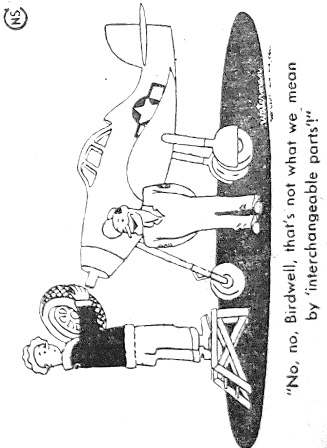
|
‘Special’ Men Cut Disk For Airwaves
The outstanding record of the B-29 Superfortress, "General H. H. Arnold Special," in the 20th Bomber Command's aerial offensive against Japan was told for American radio listeners in a recording prepared at a B-29 base in India for use on an Amry Air Forces broadcast in the United States.
Taking part in the program were Major General Curtis LeMay, commanding general of the Jap-raiding Bomber Command; Major Hugh M. Higgins, the command's Public Relations Officer, and three crew members of the "Special," the Superfort selected on the assembly line at the Boeing Plant in Wichita by General Arnold as "his own plane" and named in his honor.
Reviewing the performance of the "Special," General LeMay stated that its combat record "leaves little to be desired" and emphasized at the same time that "perhaps the most satisfying aspect of its record is the fact that this performance is typical of the B-29's in the Command."
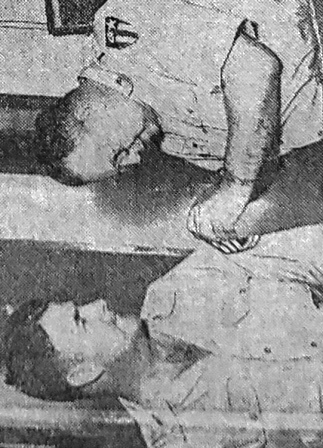 William H. Kessler, left, being 'de-striped' by Lt. Col. A. M. O'Dell, right, deputy commander, Base General Depot 2, who previously presented him with a set of second lieutenant's bars. The former technical sergeant received a direct commission on direct order of the Theatre commander. (Signal Corps photo)
William H. Kessler, left, being 'de-striped' by Lt. Col. A. M. O'Dell, right, deputy commander, Base General Depot 2, who previously presented him with a set of second lieutenant's bars. The former technical sergeant received a direct commission on direct order of the Theatre commander. (Signal Corps photo)
|
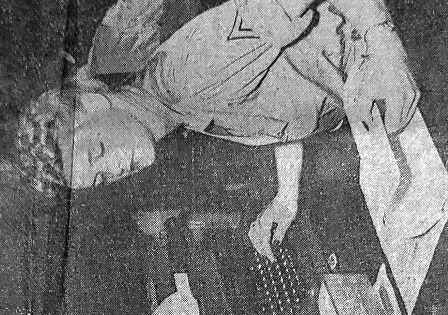

“WACS AT
WORK”

Busy Thunderbolt Group Now In India
One of the most travelled fighter groups in the USAAF is now operating with the Tenth Air Force, Eastern Air Command, in India. This P-47 (Thunderbolt) unit has made twenty-six major moves since it took off from aircraft carriers during the invasion of North Africa in 1942.
The group lived in pup tents near its flight strip when it finally settled down in North Africa. The African battle soon moved into Tunisia and the group followed. It was the first fighter organization to operate from Tunisian soil. In one twelve-day period there, it knocked out forty-two German planes.
As the Allies closed in on Cape Bon, Nazi resistance increased and the group had to dig in. Its food was cooked with comaparitive safety in an underground kitchen, but the men had to eat it in their foxholes.
Soon afterwards the group took part in the bombing of Pantelleria. When the island surrenderd, it set up housekeeping in an underground hangar that had been built by the Italians. After a relatively comfortable stay there, the group moved on to Sicily, where the all-Negro 99th Squadron took part in its operations, and then to the Salerno beachhead. In the Salerno action, the ground echelon was converted into an infantry reserve.
The fighter crews were transferred to India directly from their tents in Italy. They were credited with the destruction of more than 130 German planes in Europe.
 ARMY-NAVY BATTERS FORMOSA - PATHWAY TO JAPANd
ARMY-NAVY BATTERS FORMOSA - PATHWAY TO JAPANd (Left) Okayama Aircraft Assembly plant, Formosa, after combined Army-Navy attacks. Plant in left of the picture is almost completely destroyed and heavy damage is apparent to the administrative and hangar areas in the center of the photo as well as to the airfield. (Right) The plant during the second attack of the XXth Bomber Command on the 16th of October. Destruction resulting from the previous Army-Navy attacks may be seen with still more in progress.
ARC Establishes New Service For Officers
Adding to its long list of benefits to the enlisted men, the American Red Cross established a new office this week in the Headquarters building, under the direction of Mrs. Anne-Marie Innes of Oslo, Norway, for the exclusive patronage of officers.
The new office has been set up to offer to the officers the same services that the ARC has available for enlisted men. Mrs. Innes will conduct sight-seeing and shopping tours, inform the officers where they may go for recreational and sports activity, and advise them as to where and how they may take advantage of the many other facilities and services that the Red Cross has to offer.
Centrally locatewd in the Headquarters building it is readily accessible to local officers and those in town on furlough. Later on it os planned to inaugerate a system whereby those stationed up-country and unable to get to town may be able to use the facilities of this new office.
When one of the XX Bomber Command's huge B-29s was forced down on an emergency landing field in India recently, it looked like the native populace was about to fall heir to a lot of aluminum. The field was just big enough to accomodate the long-range bombers on the landing, but the take-off would be quite another matter, since the big wheels sank eight inches into the soft soil each time it was moved. After sizing up the situation, the USAAF Air Engineer requested that the field be lengthened, and called on the British Deputy Chief Engineer to help him with the job. The D.C.E. flew down from his home base to assure the Americans that he would put all his resources at their disposal to help with the job. What went on after that is the best proof of American-British co-operation. Four distinct organizations, two American, one British and one Indian civilian department complketed the task. The D.C.E. made an estimate of the required equipment and sent out a call to the Central Public Works Department, which furnished the manpower, to the tune of more than 300 laborers. All equipment was moved by rail to a point within two miles of the field, due to the inaccessibility of roads and bridges in the locality. Equipment was moved from the rail siding to the job over an existing roadway under construction. All materials were loaded by hand. The SOS Area Engineer, who had by this time also been brought in, placed an officer and 10 enlisted men on the job to move the equipment, to act as foremen and equipment operators. A pierced plank-standing had to be built to support the big bomber during the motor warm-up period so the wheels would not sink into the ground even further. When the pilot reported to the field to take the plane off, he wasn't so sure about the new field and requested that it be lengthened even more. The tediously constructed plank-standing had to be torn up and rebuilt further back, and to make things even worse the job was done during three days of constant downpour. One morning, bright and early, the pilot announced his satisfaction with the field, climbed in the big ship, and started her down the field. More than 400 men, who had toiled for days on end to make this day possible waited with baited breath to see what would happen. American, British and Indian had worked side by siode - now for the test. The B-29 made it, and with room to spare. A close inspection afterward revealed that the huge warbird had not sunk into the hard surface of the field at all, not even leaving wheel marks down the long runway. Here was a first class heavy duty airfield built for future use, and it was built under adverse conditions and in an emergency. |
“Jungle Dream” ARC Holds Hallowe’en Party
An old-fashioned Hallowe'en party was held Hallowe'en night at the 'Jungle Dream,' ARC club at the Rest Camp, for all the GIs in town for a furlough.
All the traditional Hallowe'en games were conducted for the benefit of the rest-campers, refreshments were served and there was music for dancing to the tune of an American 'Juke-box,' which was especially procured for the occasion. In the entertainment at the party Sgt. Philip Monaro, Saulte Ste. Marie, Mich., wowed the house with a take-off on Carmen Miranda.
Pfc. Frank J. Mascaro, New York City, Sgt. Roy A. Herron, St, Louis, Mo., Corp. Thomas Spisak, McKees Rock, Penn., and Sgt. Melvin Blanchard, worked a whole week on their furlough time fashioning the decorations for the affair. Miss Ruth Zang, State College, Penn., club director, supervised the party.
The following items have been reported lost, finder please return to Provost Marshal's office, Hq. Building, or to any Military Police station - LOST: 1 Wallet, containing misc. papers, furlough papers, dog tags. Inside of wallet has initials "D.R.V. - property of Sgt. Dominic Veally, ASN 32019147. 1 Wallet, brown, Indian Style, containing R's 580, 3 drivers licenses, cards, etc., belonging to Pfc. Raymond Burdett, Lost near Cosmos Club. FOUND: 2 Parachutes, Nos. 42-154012 and 42-18686 - possibly belonging to John T. Eikoff ASN 13004714 and James B. Mauel ASN 36230314. 1 Duffle Bag at Sealdah Station, belonging to Pvt. Albert A. Ferrell ASN 35227846. 1 US Tire No. 10.50x16-E. 517710 at Howrah Station. 1 Duffle Bag, belonging to Donald Waterman ASN 35012661 at Howrah Station. 1 Musette Bag and 1 blue Barracks Bag probaly property of Corp. Sapp at Howrah Station. 1 Khaki Bag belonging to A. Searcles ASN 32849603. 1 Small Leather Case containing toilet articles. Name: Ben Slosky. |
“Marriage” In Assam
ATC BASE, APO 466 - World premieres are thought to be something even in cinema's backyard in Hollywood, but when they take place in the jungles of Assam - well, brother, that's something to shout about.
Picking it up from there, the special service office at this India China Division ATC base really touted the opening performance of "Marriage is a Private Affair" with Lana Turner. Not only did a placarded elephant parade the grounds to inform all of the premiere, but the boys put on a burlesque Hollywood premiere to end all premieres.
The largest crowd ever assembled at this base jam-packed the Mosquito Dome theater to see the show. As a wind-up, a la Grauman's Chinese theater, the GI version of cinema celebrities left their "Assam prints" on specially arranged latrine seats on the stage. The show was directed by S/Sgt. Raymond Gray, Hollywood. Lt. Billy O. Phillips is Special Service Officer.
Impersonating the stars were Pvt. Henry Clay, Chicago, as Rochester; Pvt. Earl T. Booker, Nashville, Tenn., as Lena Horne; S/Sgt. Ray Paralta, Los Angeles, as Fred Astaire; Pfc. Arthur George, Hartford, Conn., as Gene Autry; Pvt. Lou Coury, Springfield, Mass., as Groucho Marx; Corp. Lawrence Shiner, Allentown, Pa., as Buster Keaton; Pvt. Andrew Duggan, Houston, Tex., as battered, bruished and bandaged Jon Hall; Pfc. Charles Brown, Lynchburg, Va., and Pvts. George A. Anderson, Baltimore, Md.; Henry Clay; John Brutcher, Memphis, Tenn., and nathaniel Barlow, Jamaica, N.Y., as the Ink Spots.
ARC Issues 13-Point Program To Help GIs
In an effort to acquaint American servicemen with the facilities and services of the American Red Cross Field Director's office, a 13 point program was released this week. The release points out what the Director's office is prepared to do, in order to aid service men who may wish to discuss personal problems, communicate with other servicemen or borow money.
Located at 17 Stephen House, two doors below the ARC Burra Club, the Field Director's office is open from 9 a.m. to 8:30 p.m. It is emphasized that the night hours are for servicemen who are unable to come to the office during the day because of the nature of their duties.
Financial aid will be extended to men who are going on convalescent or emergency furloughs, for personal needs of men stationed at this A.P.O., and men at this A.P.O. on furlough who cannot secure funds through military channels. The Director pointed out that loans cannot be ordinarily extended to men staying at local rest camps, to buy gifts, or to pay expenses of men on D.S. or T.D., to send money home, or to servicemen without proper means of identification.
The Director also pointed out that the American Red Cross has many important functions with which the ordinary serviceman might not be acquainted, and that any soldier or sailor has a right to call upon them at any time for these services.
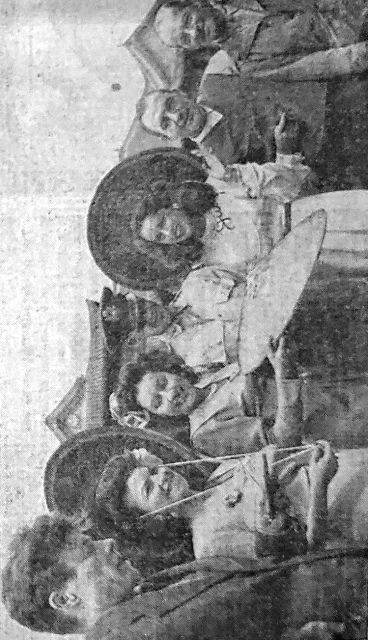 JINX OVER THE HUMP
JINX OVER THE HUMP Y-FORCE OPERATIONS STAFF, CHINA - Jinx Falkenburg, Pat O'Brien and other Hollywood folks, visiting China to entertain American troops, are welcomed on arrival after flight over Himalayan hump by Col. John W. Middleton, Deputy Chief of Staff of Y-Force. Left to right, Jimmy Dodd, Guitarist; Ruth Carroll, Singer; Betty Heaton, Dancer; Colonel Middleton; Jinx; O'Brien and Harry Brown, Pianist. |
Pat O'Brien Troupe
Not Scheduled Here
Pat O'Brien, Jinx Falkenburg and troupe, USO Show No. 374, will not appear in the Calcutta area, it was announced by the Base Section Special Service Office this week.
Because of the limited time alloted to the troupe by the War Department to tour the entire theatre, it will be impossible to cover all the many spread-out installations. In compliance with the request of the theatre commander, it is felt that the purpose of the tour would be best served if the troupe entertained in the forward areas where the entertainment facilities are more limited than in the Calcutta area.
Though this unit will not play here, others are now playing and the new Entertainment Unit is readying still other units to take on tour in the near future.
PRIVATE FIRST CLASS TO TECHNICIAN FIFTH GRADE Claudie D. Mills, Sherrill, Arkansas John C. Farber, Magnolia, Ohio SECOND LIEUTENANT TO FIRST LIEUTENANT Anthony H. Ortenzi, Baltimore, Maryland N. M. Marailius, Jr., Trumbull, Connecticut Alexander H. Willard, Philadelphia, Pennsylvania |
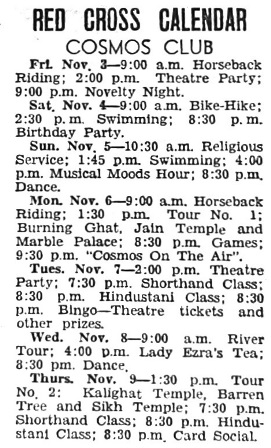
|
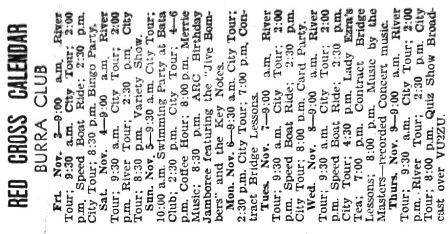
|
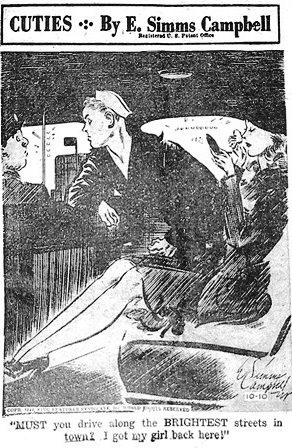
|
The news of the appointment of Lt. Gen. Daniel I. Sultan to the newly-created post as commanding general of the India-Burma theatre and the consequent biogrphies of him, recall to mind that he not only was a star athlete at West Point, but later, as coach of West Point, was responsible for the introduction of Notre Dame to the Eastern Football Fans.
Sultan was a top-flight tackle at the University of Mississippi for a year and a half. He received an appointment to the Military Academey and spent four years as center and tackle on the Cadets team before his graduation in 1907. After a tour of duty he was recalled to the Point and served as coach of the foorball team from 1912-16; and thereby hangs a tale.
In those days, as now, the Cadets were playing a tough schedule, booking Harvard, Yale and Princeton just prior to the Navy game. And in those days the 'Ivy League' eleven were rough and tough teams. So Sultan thought that the Army club needed a 'breather' before the traditional Navy encounter. Not too tough, but a team that would give good competition and sharpen up the boys for the following week.
Somebodty suggested that Notre Dame out in Indiana would be a good team to book. Nobody had ever heard of ND at that time but Sultan sent them an offer of a $1,000 guarantee and room and board to play, and after dickering, Jesse Harper of ND settled on a $1,100 guarantee. Shades of the financial deals today when Army-Notre Dame classics usually result in a split of about $300,000 ! !
Came the eventful day of the game and all was cheerful at West Point. At the half the Cadets were ruffled but not really disturbed when the score read 13-13. Then it came. In the second half, the Irish, captained by the immortal Knute Rockne and with Gus Dorias as quarterback, literally ran wild as they pased the Cadets dizzy, and beat them 35-13.
It was one of the most sensational upsets in football, the first exhibition of real forward passing in the game and the introduction of Notre Dame to the East.
During his career as coach at the Military Academy, Sultan was credited with introducing the spiral pass from center to the back-field to American football. Sultan later served for three years on the Football Rules Committee when Walter Camp was its president.
Nowadays Sultan confines his athletic activity to the golf course on his off time. He's long off the tee, shoots in the 90's but has a tendency to hook his drives.
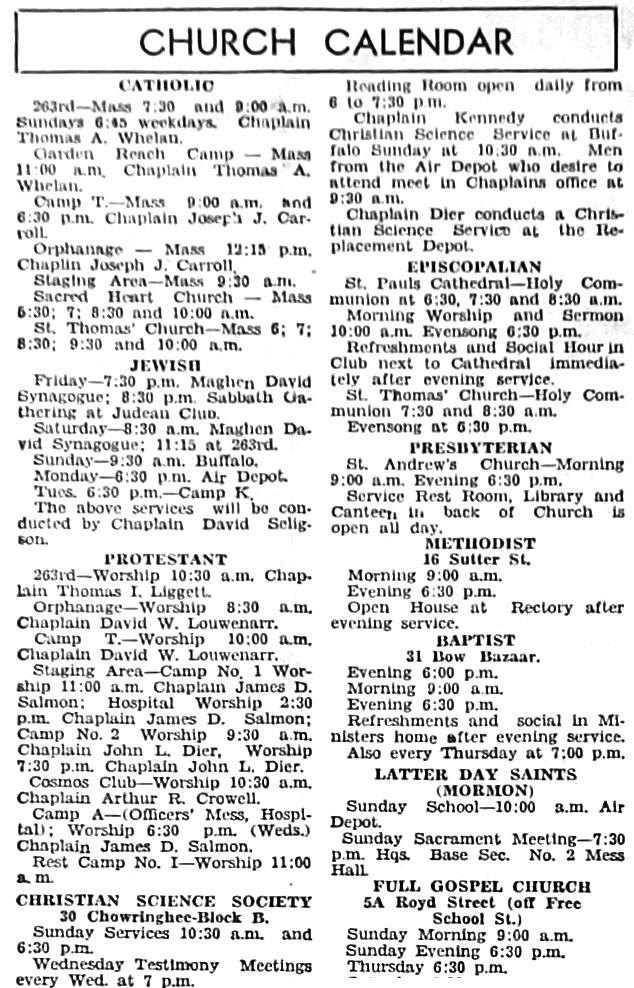
|
‘Tea Planters’ Loop
Opens Ball Season
ATC APO 429, INDIA - All pepped up over a record of 15 wins out of 15 games played, the ATC baseball team at this India China Division base organized the Tea Planter Baseball League and lost a heart-breaker to the Signal Co., 3-2, in the opening game.
In the last five games prior to the organization of the league, the ATC team scored shut-outs against the opposition. Much credit for the victories goes to Pfc. John Shaffer, pitcher in a majority of the games, and an array of heavy hitters, including S/Sgt. Fred Durr, Corp. P. DeStefano and Sgt. B. Lindgren. The infield comprises Sgt. L. N. Venable, Pfc. Constancy, Corp. DeStefano, and Corp. N. Contura. S/Sgt. Conte, has athletic director, is team manager.
Tarantino Winner
Against Frischerz
A record-breaking crowd jammed the Calcutta Football Stadium Wednesday night to watch the unveiling of the current All-American boxing tourney and were well repaid for their efforts as seven crowd-pleasing bouts were fought.
In the feature bout of the evening Terry Tarantino, Meriden, Conn., reversed an early-season decision which Joe Frisherz, San Francisco, Cal., scored over him in the same ring. It was a different Terry that came into the ring Wednesday night. Obviously in much better shape as a result of recent bouts. He used all his experience to win the unanimous decision of the judges. Keeping on top of Frischerz all through the three round bout, he never let the younger fighter get set and effectively tied up his powerful left hand.


|
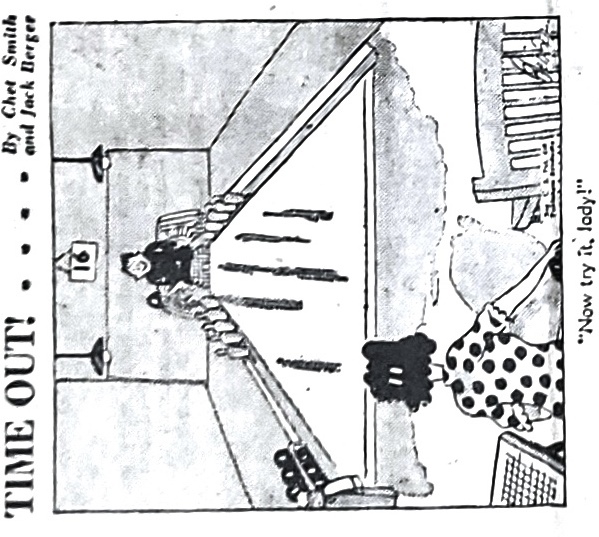
|
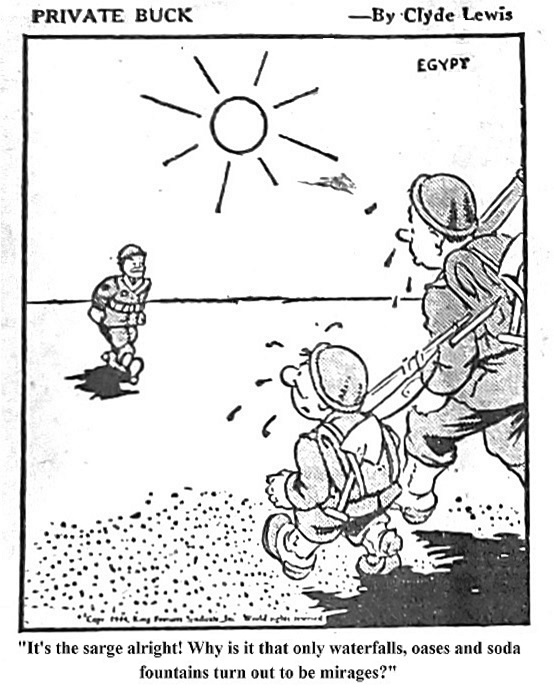
|
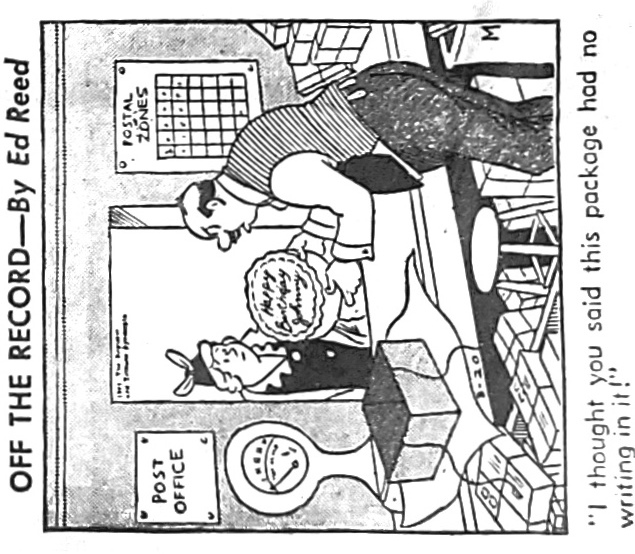
|
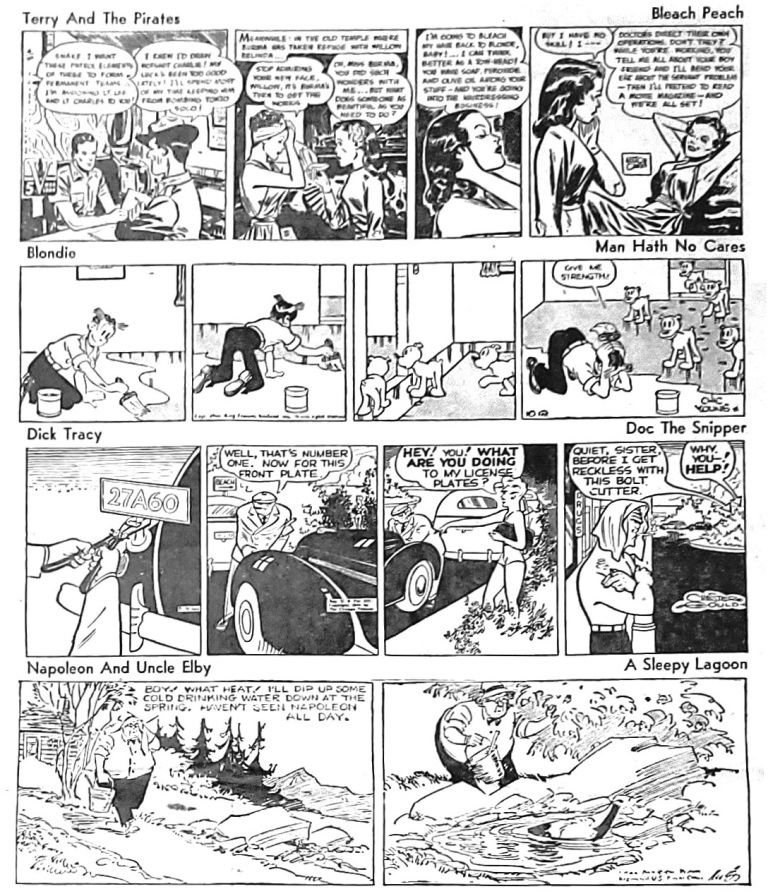
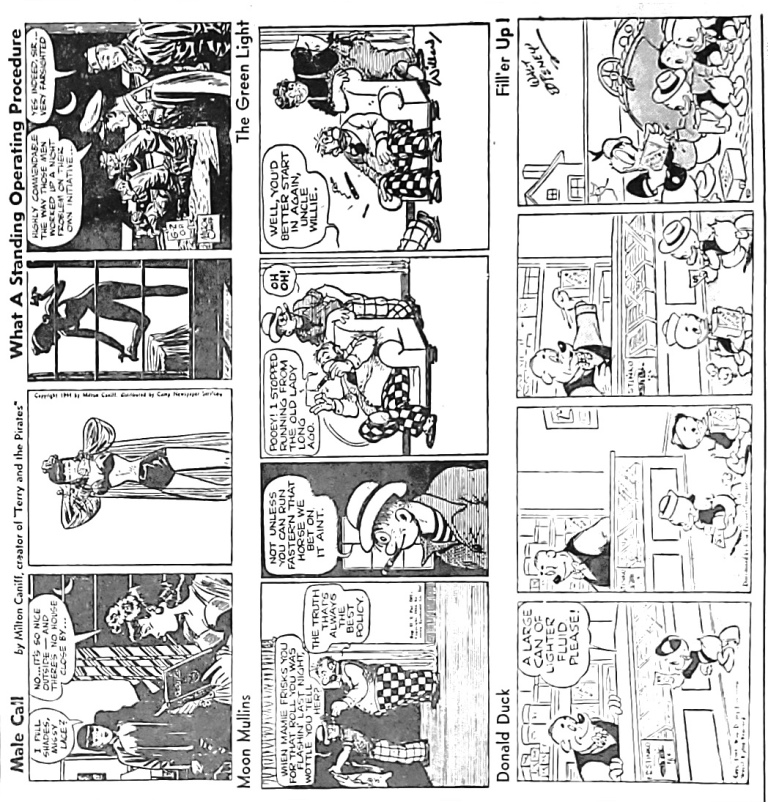

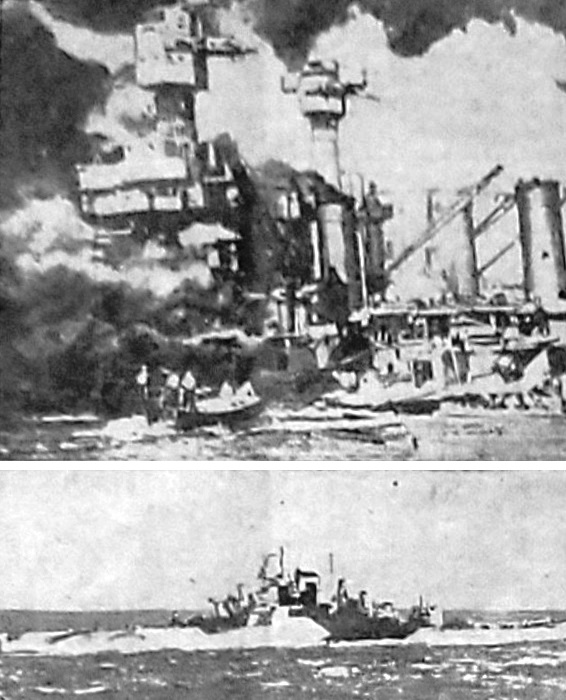 IN ACTION AGAIN
IN ACTION AGAINTop: The USS West Virginia as she looked in Pearl Harbor on December 7, 1941 and below: as she looks completely refitted and modernized, back in action in the Philippines. (Radiophoto) 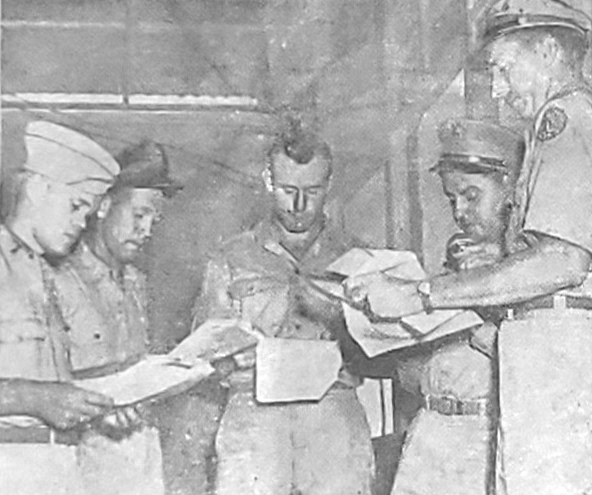 ON THE AIR
ON THE AIRThe members of the crew of the "Arnold Special" making a recording for rebroadcast in the U.S. They are, left to right, Lt. Melvin Scherer, Matoon, Ill., navigator; Lt. Robert Feldman, Hibbing, Minn., flight engineer; and Capt. Weston Price, Long View, Wash., pilot. They are shown with Maj. Gen. Curtis LeMay, commanding general XX Bomber Command and Major Hugh Higgins, public relations officer. 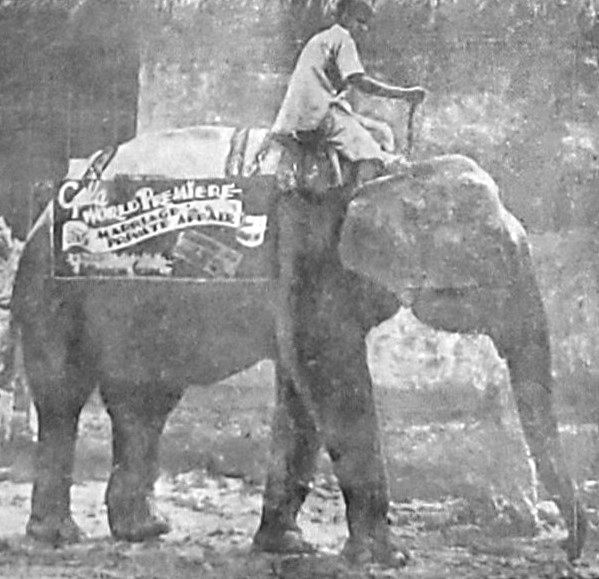 BIG AD
BIG ADFor the big premiere of "Marriage is a Private Affair" at an ATC base in India a big advertising campaign seemed in order, so this placarded elephant was used to help pack the house for the opening. |
|
THE COMMAND POST. Published weekly by the Headquarters of Base Section 2 for military personnel only. Lt. Lester H. Geiss, Director, S/Sgt. Harry Purcell, Editor; S/Sgt. Jesse Sincere, circulation; Sgt. Maurice Pernod, news; Sgt. Bernard Cohen, drama; Pvt. Adolph A. Reibel, reporter. Printed at the "Patrika Press"

Vol. II No. 9 ~ NOVEMBER 3, 1944
Adapted from the original issue of THE COMMAND POST
Copyright © 2023 Carl Warren Weidenburner
TOP OF PAGE ABOUT THIS PAGE E-MAIL YOUR COMMENTS CLOSE THIS WINDOW
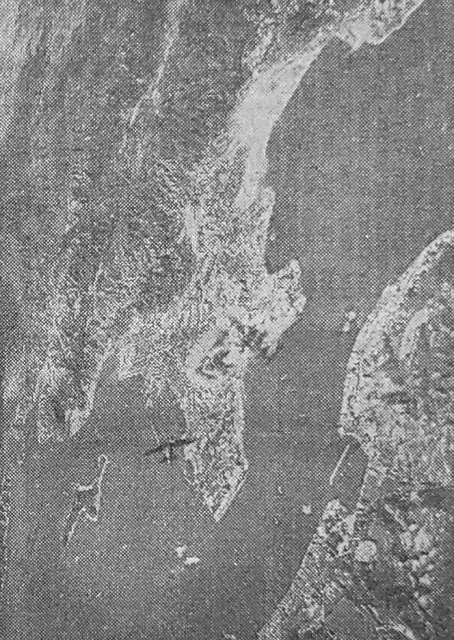 JAPS GUESSED WRONG
JAPS GUESSED WRONG 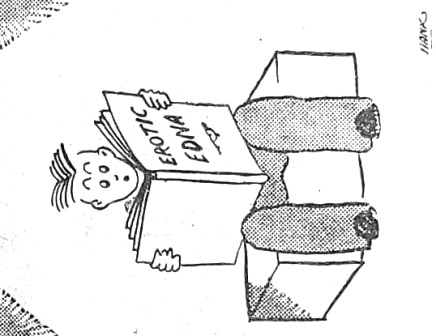
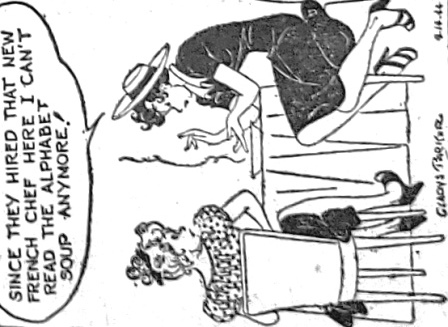
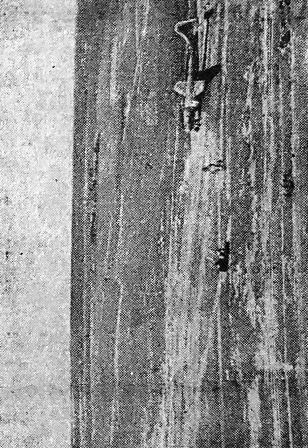 Superfort, seen from the air, just before taking-off from the improvised runway constructed 'somewhere in India' by SOS District Engineers.
Superfort, seen from the air, just before taking-off from the improvised runway constructed 'somewhere in India' by SOS District Engineers.
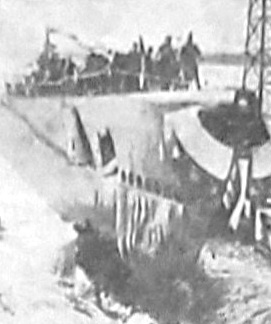 TWO A MONTH
TWO A MONTH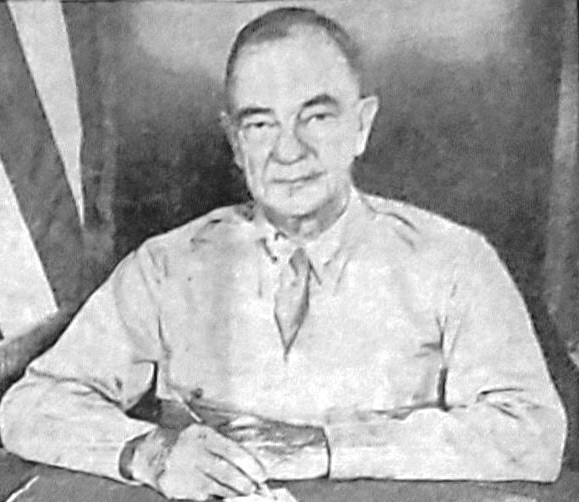 NEW IBTO BOSS
NEW IBTO BOSS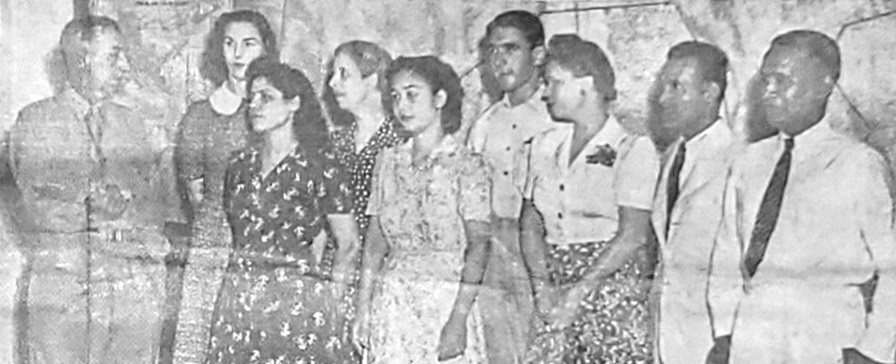 AWARD WINNERS
AWARD WINNERS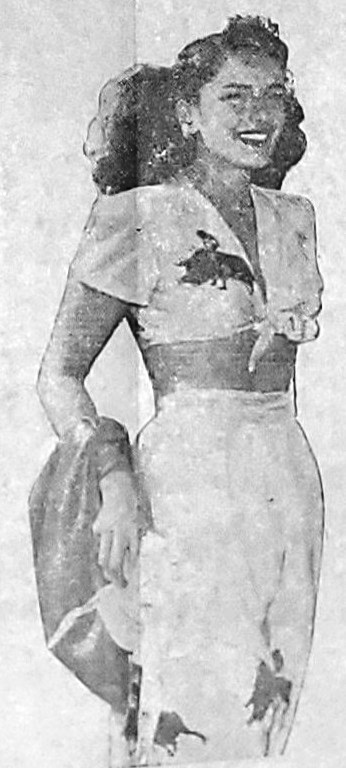 "MM-MMM"
"MM-MMM"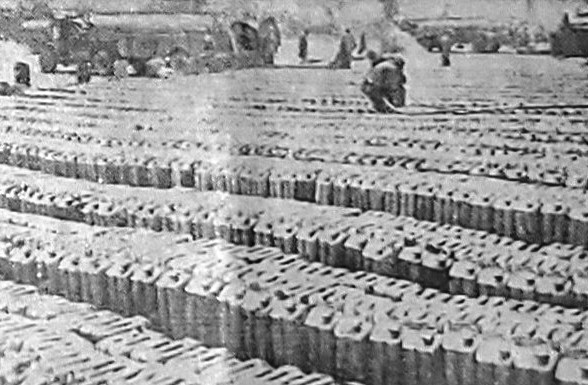 FUEL FOR AIR WAR
FUEL FOR AIR WAR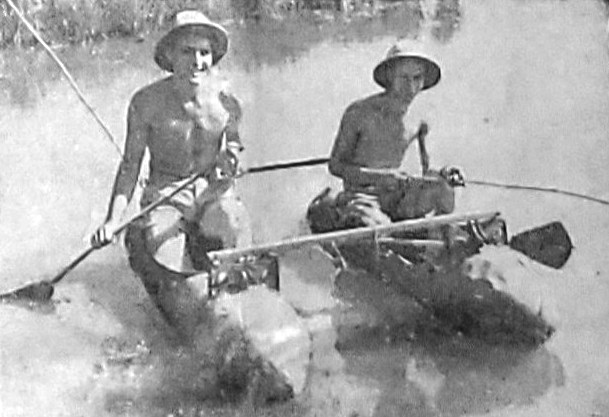 TANK-BOAT
TANK-BOAT